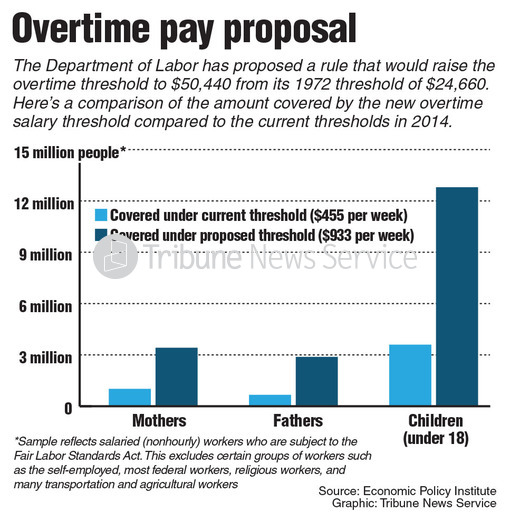Hourly pay is a simple concept — you work for an hour and your boss pays you a certain amount for that work. But sometimes, the number of hours worked have a detrimental impact on our health and happiness. Yet, legislators have allowed overtime pay — the intended counterbalancing force — to degrade over the past 40 years.
Soon, however, overtime will reclaim its place as an integral part of worker protection.
President Barack Obama recently announced a reform to the U.S. Department of Labor standards that direct overtime in a June op-ed for the Huffington Post. This move fulfills a 2014 executive order looking into the effects of such reform. His plan targets the threshold pay level for mandatory overtime benefits, doubling the maximum from $23,660 annually (or $455 a week) to $50,440 (or $970 a week). This means that anybody who makes up to $50,440 a year is now able to get mandatory overtime benefits. Before, executive administrators deemed anyone who made more than $23,660 too highly paid to earn overtime benefits. The move is, by far, the most significant labor reform of his administration — and one that positively affects millions of American workers.
The executive action called for a 60-day public comment period that ended on Sept. 4. Obama has implemented the new overtime rules, but the changes will not go into effect until 2016.
The new change does not solve all of the program’s problems, but the criticism it has endured is misplaced and ignores just how overdue any reform is.
Overtime pay originated as a federal mandate with the Fair Labor Standards Act, which designated 40 hours as the standard work week in 1938. Employers were then required to pay their workers 1 1/2 times their regular pay for each hour worked past that point.
But the initiative had a catch: many industries were exempt from this rule. Most notably, these were industries that were part of the learned professionals category. This included teachers, anyone working in science or medicine and administrators. These exemptions were originally set to prevent the highest-earning salary workers from collecting disproportionate incomes, but they went too far.
Under the Bush administration’s vague adjustment to the act, many jobs that required college degrees were exempt. Also exempted were jobs in supervisory roles. While this further cut out highly paid executives, its effects extended to relatively low-income managers working in retail and fast food. Consequently, exemptions became more of an obstacle to fair compensation for these workers than a sign that they did not require assistance.
According to a 2013 report published by the Economic Policy Institute, only 11 percent of salaried workers qualified for mandatory overtime under these conditions in 2013, compared to more than 65 percent in 1975. Since then, the government has only updated the wage threshold once, in 2004, but that change carried with it an expansion of the already restrictive exemptions.
Moreover, the 2004 increase from $250 per week to $455 did not accurately make up for the growth of inflation. As the National Public Radio pointed out, the overtime threshold in 1970 was comparable to the country’s median pay level at the time. The $455 threshold, however, was and remains only about half the median. The President’s new threshold is actually higher than the current median of $801 per week. The previous threshold of $455 was $590 below the poverty line for a family of four.
This measure has also reorganized the model for future increases, which is potentially the largest formal change. Previously, the act did not have a mandate in place to revisit overtime rules in light of changing economic conditions. Now, the new measure has pegged the minimum salary threshold to the 40th percentile of national incomes. With this change, the future relevance of overtime benefits has become much more secure.
But more significant than the specific fiscal change is the sheer scope of its effects. The Pew Research Center has estimated that the change is likely to extend overtime benefits to nearly five million more people, most of them low-level, white-collar workers. According to a Gallup poll from 2013, only eight percent of full-time employees worked less than 40 hours a week. These workers, who serve as retail managers, computer technicians and healthcare workers, will now receive fair compensation for the long hours that these occupations often require. In total, nearly 40 percent of American workers will now receive overtime, and, according to U.S. Secretary of Labor Tom Perez, that works out to nearly $1.3 billion in new income nationwide.
The main criticism from left-leaning groups like the Economic Policy Institute, which wanted a larger change and an indexing to inflation, has been that it is still fairly easy for employers to get around paying overtime. If their workers make even a dime more than the threshold, they are exempt, so it might seem like generally inconsequential changes would allow them to escape paying workers extra. But this critique misses the point.
In order to get around the threshold in this way, employers would need to raise wages to meet the new threshold level. The alternative to that is hiring more workers so that current staff need not work enough hours to qualify. What would be the real consequences of these supposed workarounds? Higher overall wages and increased employment, respectively. Yes, they would still prevent some workers from receiving benefits, but as a whole, there is a net benefit to the overtime change.
The latter issue may be a genuine concern if it causes full-time workers to be pushed into part-time. But if the core worry is that part-time workers are worse off than full-time workers, it makes little sense to fight the overtime reform instead of pushing for higher minimum wages for those part-timers. There is no reason to resist giving benefits to the middle and working class in the name of low-income workers without discussing why these people have such low incomes in the first place.
As entrepreneur Nick Hanauer wrote in an op-ed on overtime reform for Politico last year, “If corporate America didn’t want to pay you time and a half, it would need to hire hundreds of thousands of additional workers to pick up the slack — slashing the unemployment rate and forcing up wages.”
Conservative criticism from the U.S. Chamber of Commerce has relied on the same type of rhetoric that most labor changes receive: moves like this place unacceptable burdens on businesses and will result in overall job loss.
Both of these arguments fail for the same reasons that trickle-down policies have. If employers increase wages, people, on average, will have more money and can spend it on products that these businesses make. With more money, employers can avoid firing people. This is microeconomics 101.
While overtime is not the sole solution to wage stagnation, it is a necessary form of worker protection. President Obama’s change may not be as extensive as the far left would like, but it is pretty close. Its moderate nature may keep it from being as hyper-partisan as issues like minimum wage raises, but that does not mean it deserves any less attention.
Write to Matthew at [email protected].



